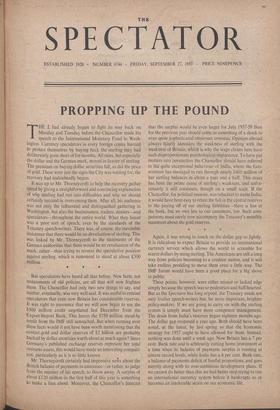PROPPING UP THE POUND
THE £ had already begun to fight its way back on Monday and Tuesday before the Chancellor made his speech to the International Monetary Fund in Wash- ington. Currency speculators'in every foreign centre hurried to protect themselves by buying back the sterling they had deliberately gone short of for months. All rates, but especially the dollar and the German mark, moved in favour of sterling. The premium on buying dollar securities fell, as did the price of gold. These were just the signs the City was waiting for; the recovery had undoubtedly begun.
It was up to Mr. Thorneycroft to help the recovery gather speed by giving a straightforward and convincing explanation of why sterling had run into difficulties and why we should certainly succeed in overcoming, them. After all, his audience was not only the influential and distinguished gathering in Washington, but also the businessmen, traders, dealers—and speculators—throughout the entire world. What they heard was a poor sort of speech, even by the standards of the Treasury speech-writers. There was, of course, the inevitable insistence that there would be no devaluation of sterling. This was linked by Mr. Thorneycroft to the statements of the German authorities that there would be no revaluation of the mark, either—thus trying to reverse the speculative position against sterling, which is rumoured to stand at about £300 million.
* * * But speculators have heard all that before. New facts, not restatements of old policies, are all that will now frighten them. The Chancellor had only two new things to say, and neither, eventually, was very well said. It was useful to remind speculators that even now Britain has considerable reserves. It was right to announce that we will now begin to use the $500 million credit negotiated last December from the Export-Import Bank. This leaves the $750 million stand-by credit from the IMF still untouched. But when running over these facts would it not have been worth mentioning that the central..gold and dollar reserves of $2 billion are probably backed by dollar securities worth about as much again? Since Germany's published exchange reserves represent her total overseas assets, this would have made an interesting compari- son, particularly as it is so little known. Mr. Thorneycroft certainly had impressive news about the British balance of payments to announce—or rather, to judge from the manner of his speech, to throw away. A surplus of about £120 million in the first half of this year is something to make a fuss about. Moreover, the Chancellor's forecast that the surplus would be even larger for July 1957-58 than for the previous year should come as something of a shock to even quite Sophisticated observers overseas' Opinion'abroad always falsely identifies the weakness of sterling with the weakness of Britain, which is why the wage claims here have such disproportionate psychological importance. To have put matters into perspective the Chancellor should have referred to the quite exceptional behaviour of India, where the Gov- ernment has managed to run through nearly £400. million, of her sterling balances in about a year and a half. This drain has been the prime cause of sterling's weakness, and unfor- tunately it still continues, 'though on a small scale. If the Chancellor, for political reasons, was reluctant to name India; it would have been easy to relate the fall in the central reserves to the paying off of our sterling liabilities—there is less in the bank, but we owe less to our customers, too. Such com- parisons must surely now accompany the Treasury's monthly statement about the gold reserves.
Again, it was wrong to touch on the dollar gap so lightly. It is ridiculous to expect Britain to provide an international currency service which allows the world to scramble for scarce dollars by using sterling. The Americans are still a long way from policies becoming to a creditor nation, and it will take endless prodding to move them even a little way. The IMF forum would have been a good place for a big shove in public.
These points, however, were either missed or lacked edge simply because the speech was so pedestrian and half-hearted. But as the Spectator has long argued, the Treasury needs not only livelier speech-writers but, far more important, brighter policy-makers. If we are' going to carry on with the sterling system it simply must have more competent management. The drain from India's reserves began eighteen months ago. The dollar gap reopened a year ago. Both should, have been noted, at the latest, by last spring so that the economic strategy for 1957 ought to have allowed for them. Instead, nothing was done until a week ago. Now Britain has a 7 per cent. Bank rate and is arbitrarily cutting home investment at a time when its balance of payments surplus is running at almost record levels, while India has a 4 per cent. Bank rate, a balance of payments deficit of fearful proportions, and goes merrily along with its over-ambitious development plans. If we cannot do better than this we had better stop trying to run an international currency system before it bankrupts us or becomes an intolerable strain on our economic life.
































 Previous page
Previous page